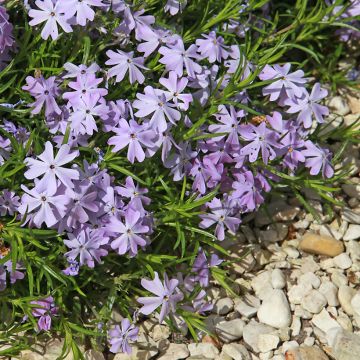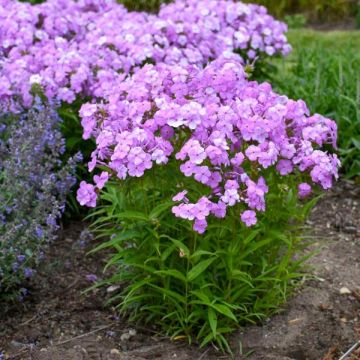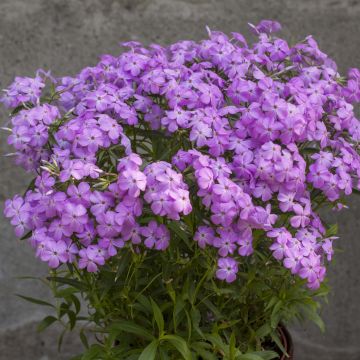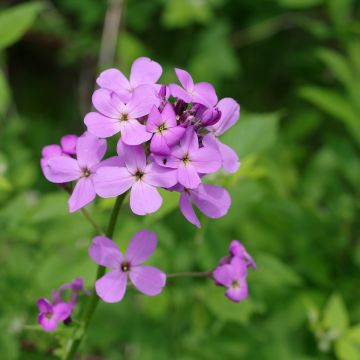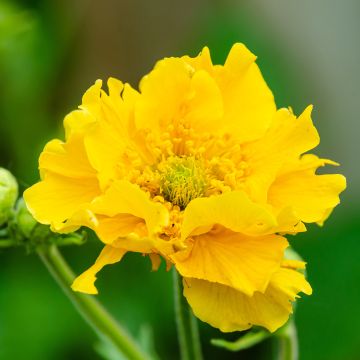

Phlox paniculata Bambini Sweet Tart Versweta
Phlox paniculata Bambini Sweet Tart Versweta
Phlox paniculata Bambini® Sweet Tart 'Versweta'
Garden Phlox, Summer Phlox, Perennial Phlox
Special offer!
Receive a €20 voucher for any order over €90 (excluding delivery costs, credit notes, and plastic-free options)!
1- Add your favorite plants to your cart.
2- Once you have reached €90, confirm your order (you can even choose the delivery date!).
3- As soon as your order is shipped, you will receive an email containing your voucher code, valid for 3 months (90 days).
Your voucher is unique and can only be used once, for any order with a minimum value of €20, excluding delivery costs.
Can be combined with other current offers, non-divisible and non-refundable.
Home or relay delivery (depending on size and destination)
Schedule delivery date,
and select date in basket
This plant carries a 12 months recovery warranty
More information
We guarantee the quality of our plants for a full growing cycle, and will replace at our expense any plant that fails to recover under normal climatic and planting conditions.
Would this plant suit my garden?
Set up your Plantfit profile →
Description
Phlox paniculata Bambini 'Sweet Tart' belongs to a series of miniature phlox developed for their compactness, abundance of flowers, and vibrant colours. This variety does not exceed 25 cm (10in) in all directions, but it produces large clusters of flowers which are bright pink, close to fuchsia pink. Its foliage, dense and bushy, in a deep green shade, and is resistant to mildew. It is ideal for pots or hanging baskets, as well as for garden borders. It thrives in full sun or partial shade.
Phlox paniculata Bambini 'Sweet Tart' is the result of 10 years of selective breeding. It belongs to the family of Polemoniaceae. It is a perennial plant with a woody stump forming a small dense clump of leafy stems. The stems, stiff and sturdy, are covered with dark green, yet vibrant, leaves measuring 10 cm (4in) in length, lanceolate to ovate. The flowering begins in early July, before that of other varieties, and continues until September, provided that faded inflorescences are removed. The small flowers have a tubular corolla, in a bright pink colour. They are clustered at the end of the stems in dense and globular panicles, slightly fragrant, whose weight barely bends the very short stems. The flowering is melliferous and nectariferous.
This Phlox paniculata appreciates a sunny location, although it tolerates some shade. Its exceptionally compact size makes it a good subject for foregrounds of flowerbeds, borders, and of course, containers in all gardens, even the smallest ones. In romantically-inspired flowerbeds or cottage gardens, phlox offer a long and generous flowering period. They go well with flowers of different shapes, including lighter ones such as Liatris spicata, Heleniums. Mix different varieties of the Bambini series together in borders. Also consider small daylilies, miniature roses, and dwarf Asters, as well as small ornamental garlics.
Report an error about the product description
Flowering
Foliage
Plant habit
Botanical data
Phlox
paniculata
Bambini® Sweet Tart 'Versweta'
Polemoniaceae
Garden Phlox, Summer Phlox, Perennial Phlox
Cultivar or hybrid
Other Phlox
View all →Planting and care
Phlox paniculata are easy-to-grow plants in full sun, in deep ordinary soil that does not dry out. The Bambini Sweet Tart phlox prefers a damp and rich soil, even clay which is well drained. It needs sun to flower well. A too dry or too hot environment makes the foliage more susceptible to powdery mildew. If planted in the sun in a climate with hot summers, it will require regular watering and mulching at the base. Pruning faded flowers promotes a second flowering at the end of the season. Protect young plants from slugs, which are fond of their tender shoots.
Planting period
Intended location
Care
This item has not been reviewed yet - be the first to leave a review about it.
Similar products
Haven't found what you were looking for?
Hardiness is the lowest winter temperature a plant can endure without suffering serious damage or even dying. However, hardiness is affected by location (a sheltered area, such as a patio), protection (winter cover) and soil type (hardiness is improved by well-drained soil).

Photo Sharing Terms & Conditions
In order to encourage gardeners to interact and share their experiences, Promesse de fleurs offers various media enabling content to be uploaded onto its Site - in particular via the ‘Photo sharing’ module.
The User agrees to refrain from:
- Posting any content that is illegal, prejudicial, insulting, racist, inciteful to hatred, revisionist, contrary to public decency, that infringes on privacy or on the privacy rights of third parties, in particular the publicity rights of persons and goods, intellectual property rights, or the right to privacy.
- Submitting content on behalf of a third party;
- Impersonate the identity of a third party and/or publish any personal information about a third party;
In general, the User undertakes to refrain from any unethical behaviour.
All Content (in particular text, comments, files, images, photos, videos, creative works, etc.), which may be subject to property or intellectual property rights, image or other private rights, shall remain the property of the User, subject to the limited rights granted by the terms of the licence granted by Promesse de fleurs as stated below. Users are at liberty to publish or not to publish such Content on the Site, notably via the ‘Photo Sharing’ facility, and accept that this Content shall be made public and freely accessible, notably on the Internet.
Users further acknowledge, undertake to have ,and guarantee that they hold all necessary rights and permissions to publish such material on the Site, in particular with regard to the legislation in force pertaining to any privacy, property, intellectual property, image, or contractual rights, or rights of any other nature. By publishing such Content on the Site, Users acknowledge accepting full liability as publishers of the Content within the meaning of the law, and grant Promesse de fleurs, free of charge, an inclusive, worldwide licence for the said Content for the entire duration of its publication, including all reproduction, representation, up/downloading, displaying, performing, transmission, and storage rights.
Users also grant permission for their name to be linked to the Content and accept that this link may not always be made available.
By engaging in posting material, Users consent to their Content becoming automatically accessible on the Internet, in particular on other sites and/or blogs and/or web pages of the Promesse de fleurs site, including in particular social pages and the Promesse de fleurs catalogue.
Users may secure the removal of entrusted content free of charge by issuing a simple request via our contact form.
The flowering period indicated on our website applies to countries and regions located in USDA zone 8 (France, the United Kingdom, Ireland, the Netherlands, etc.)
It will vary according to where you live:
- In zones 9 to 10 (Italy, Spain, Greece, etc.), flowering will occur about 2 to 4 weeks earlier.
- In zones 6 to 7 (Germany, Poland, Slovenia, and lower mountainous regions), flowering will be delayed by 2 to 3 weeks.
- In zone 5 (Central Europe, Scandinavia), blooming will be delayed by 3 to 5 weeks.
In temperate climates, pruning of spring-flowering shrubs (forsythia, spireas, etc.) should be done just after flowering.
Pruning of summer-flowering shrubs (Indian Lilac, Perovskia, etc.) can be done in winter or spring.
In cold regions as well as with frost-sensitive plants, avoid pruning too early when severe frosts may still occur.
The planting period indicated on our website applies to countries and regions located in USDA zone 8 (France, United Kingdom, Ireland, Netherlands).
It will vary according to where you live:
- In Mediterranean zones (Marseille, Madrid, Milan, etc.), autumn and winter are the best planting periods.
- In continental zones (Strasbourg, Munich, Vienna, etc.), delay planting by 2 to 3 weeks in spring and bring it forward by 2 to 4 weeks in autumn.
- In mountainous regions (the Alps, Pyrenees, Carpathians, etc.), it is best to plant in late spring (May-June) or late summer (August-September).
The harvesting period indicated on our website applies to countries and regions in USDA zone 8 (France, England, Ireland, the Netherlands).
In colder areas (Scandinavia, Poland, Austria...) fruit and vegetable harvests are likely to be delayed by 3-4 weeks.
In warmer areas (Italy, Spain, Greece, etc.), harvesting will probably take place earlier, depending on weather conditions.
The sowing periods indicated on our website apply to countries and regions within USDA Zone 8 (France, UK, Ireland, Netherlands).
In colder areas (Scandinavia, Poland, Austria...), delay any outdoor sowing by 3-4 weeks, or sow under glass.
In warmer climes (Italy, Spain, Greece, etc.), bring outdoor sowing forward by a few weeks.


































